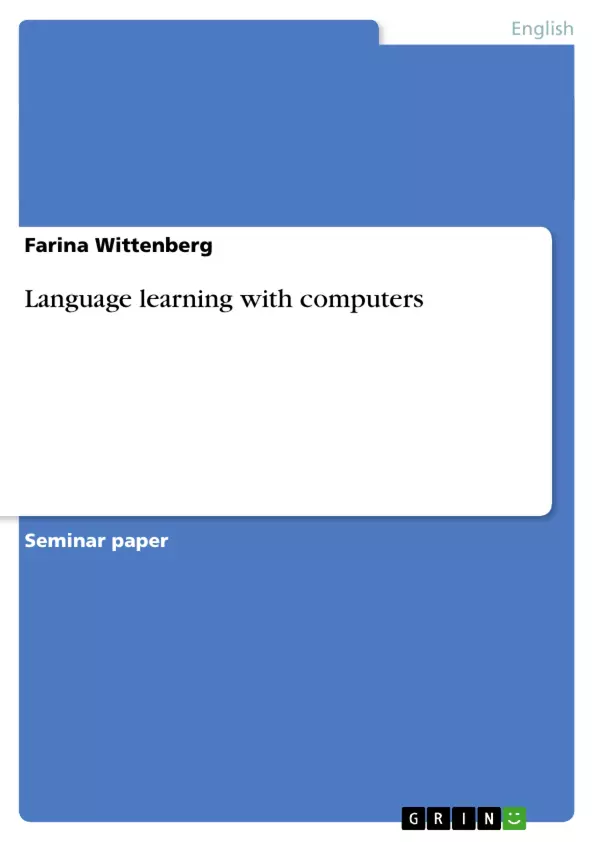This paper is based on an oral report about `computers in school´. Since
my group and I did a lot of research in schools including interviews and a
visit in a language lesson I will use our results for developing this work.
The question I asked myself before I started researching is whether
computers are a good alternative to frontal teaching in language lessons. I
will compare both teaching methods after I write about research results
about the two options. In the end an evaluation of the results will be made. First of all I have to say that Pro and Contra arguments of course slightly
vary from person to person since everyone has different points of view. I
start with listing up the Contra points.
The first point is the financial aspect of computers1. To afford the whole
equipment for a whole school costs quite a lot and is much more of an
investment than maybe some books. If the school does not have enough
money it could be unaffordable to pay for the right amount of computers,
screens, etc.
Another important aspect is that some teachers did not, like most of the
recent pupils, grow up with computers and still do not know how to handle
it. Some of them think they are too old for trying to get into this new type of
media. And even if they would try it they think they are technically not as
good as the pupils themselves and could look like a fool in front of the
class2. [...]
1 See Christiane Kallenbach, Markus Ritter: Computerideen für den Englischunterricht.
Anregungen und Beispiele für den Software- und Interneteinsatz Klassen 5-10. Berlin
2000, p. 11
2 See Kallenbach, Ritter, [See note 1], page 11
Inhaltsverzeichnis (Table of Contents)
- Introduction
- Pros and Cons for computers in school
- Teacher interview
- Pupils interview
- Visit of a language lesson
- Lesson structure
- Pupils' comments and reactions
- Teacher comments
- Pros and Cons for the frontal-teaching method
- Comparison of computer usage and frontal-lessons as language teaching methods
- Conclusion
Zielsetzung und Themenschwerpunkte (Objectives and Key Themes)
This paper explores the role of computers in language lessons, analyzing their potential as an alternative to traditional frontal teaching methods. The research investigates the advantages and disadvantages of both approaches, considering the perspectives of teachers and students, and analyzes the implications for language learning.
- Advantages and disadvantages of computer-aided language learning
- Advantages and disadvantages of frontal teaching
- The impact of computer usage on student motivation and learning outcomes
- The importance of social interaction in language learning
- The role of computers in preparing students for the information society
Zusammenfassung der Kapitel (Chapter Summaries)
The paper begins by introducing the research question and outlining the methodology used, including interviews with teachers and students, and a visit to a language lesson. Chapter 2 explores the pros and cons of computer usage in schools, considering financial concerns, teacher competence, and potential drawbacks for student engagement. Chapter 3 focuses on the pros and cons of frontal teaching methods. Chapter 4 compares the effectiveness of computers and frontal lessons as language teaching methods, analyzing their respective strengths and weaknesses.
Schlüsselwörter (Keywords)
The paper explores key concepts and terms related to language learning, including computer-aided language learning, frontal teaching methods, student motivation, social interaction, and the role of technology in education.
Frequently Asked Questions
Are computers a viable alternative to frontal teaching in language lessons?
The paper explores this question by comparing both methods, looking at research results, teacher interviews, and student perspectives to evaluate their effectiveness.
What are the financial drawbacks of using computers in schools?
Providing full equipment for an entire school is a significant investment. For schools with limited budgets, the cost of computers, screens, and maintenance can be unaffordable.
Why do some teachers struggle with computer-aided learning?
Some teachers did not grow up with computers and feel they lack the technical competence compared to their students, leading to a fear of looking incompetent in class.
How does computer usage impact student motivation?
The research indicates that computers can increase motivation and learning outcomes, although the results vary depending on the individual student's point of view.
What is the role of social interaction in language learning?
Social interaction is a key theme of the paper, as language learning often relies on communication which might be altered by a shift from frontal teaching to computer-based work.
Does technology prepare students for the information society?
Yes, one of the key themes discussed is the role of computers in equipping students with the necessary skills for a technology-driven society.
- Quote paper
- Farina Wittenberg (Author), 2004, Language learning with computers, Munich, GRIN Verlag, https://www.hausarbeiten.de/document/28765


